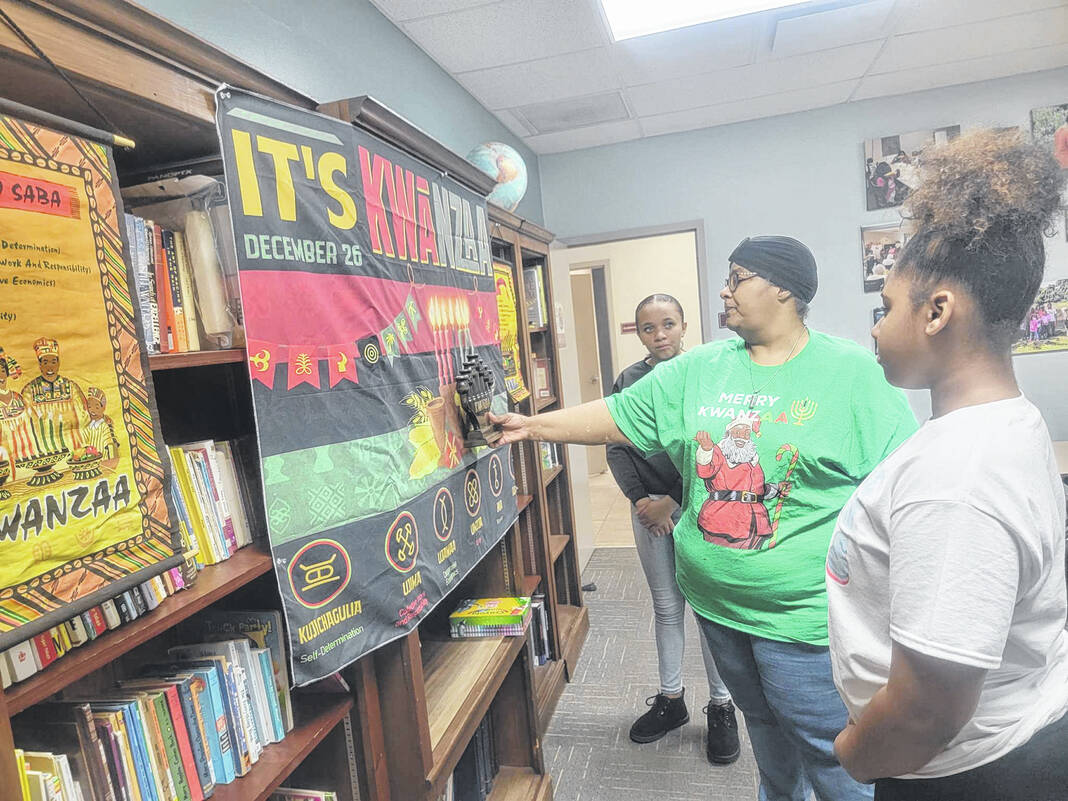
Maureen Cadogan, center, giving her lesson on Kwanzaa to a class, with two volunteers stepping in for the photo
Local community leader Maureen Cadogan recently upheld a tradition in her house of hosting a class on Kwanzaa at the 14th Street Community Center, as they wrapped up the seven days of celebration.
“Kwanzaa is a non-religious cultural holiday for us that does not conflict with any religion,” Cadogan explained. “The purpose of which is to bring unity and pride and accountability to our people and community.”
According to the National Museum of African American History and Culture (NMAAHC), Kwanzaa was created in 1966 by Maulana Ron Karenga. Kwanzaa is an African American and Pan-African holiday that celebrates history, values, family, community and culture.
“The ideas and concepts of Kwanzaa are expressed in the Swahili language, one of the most widely spoken languages in Africa,” the NMAAHC explains. “The seven principles which form its core were drawn from communitarian values found throughout the African continent.”
According to Cadogan, during the week of Kwanzaa, the customary greeting to family and friends is “Habari gani,” a Swahili phrase meaning “What is the news?” The response is one of the seven principles, depending on which day of Kwanzaa it is.
These principles include Umoja, Unity; Kujichagulia, Self-Determination; Ujima, Responsibility; Ujamaa, Cooperative Economics; Nia, Purpose); Kuumba, Creativity; and Imani, Faith.
In her class, Cadogan broke down the meanings and purposes of these principals.
December 26, Umoja, to strive for and to maintain unity in the family, community, nation, and race.
December 27, Kujichagulia, to define and name ourselves, as well as to create and speak for ourselves.
December 28,Ujima, to build and maintain our community together and make our brothers’ and sisters’ problems our problems and to solve them together.
December 29, Ujamaa, to build and maintain our own stores, shops, and other businesses and to profit from them together.
December 30, Nia, to make our collective vocation the building and developing of our community in order to restore our people to their traditional greatness.
December 31, Kuumba, to do always as much as we can, in the way we can, in order to leave our community more beautiful and beneficial than we inherited it.
January 1, Imani, to believe with all our hearts in our people, our parents, our teachers, our leaders, and the righteousness and victory of our struggle.
Cadogan said that she has been celebrating the holiday for decades, with it being a part of her family’s fabric, and has been giving lessons on it at the 14th Street Community Center for just as long.
She said this year went very well and students learned a lot in their short time together.
“They were on it and learned so much,” Cadogan said. “Some were new to Kwanzaa and some were already celebrants. It was just good to share, because want them to know where they come from, to be able to celebrate and be proud of who they are. It is a joy to see a new generation embrace it, because, if we don’t teach them, who else will?” Cadogan said. “To be able to share and watch that light shine and know this will continue another generation is so special.”
When asked what principal of Kwanzaa Cadogan thinks is most important, she quickly answered Umoja, the unity celebration.
“I think the first day, Unity, is a big one, because there is so much division in our world today. We can take this day to teach our children to unite and realize it is about all of us together, because we are all in life together,” Cadogan said. “It is like being on a big ship. You can stay on your side with your people, but know that, if the other side goes down, everyone does. If we all work together and rise, then we rise together. I think that ,if we focus more on unity, then we will all rise together.”
Reach Joseph Pratt at (740) 353-3101, by email at [email protected], © 2022 Portsmouth Daily Times, all rights reserved

